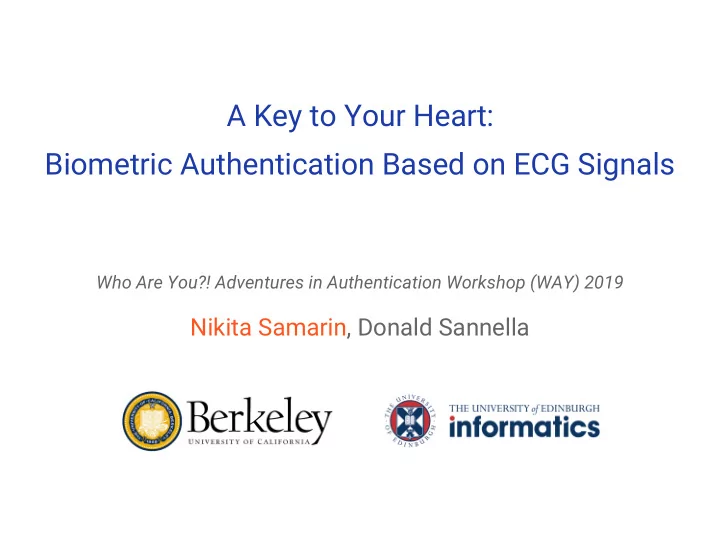

A Key to Your Heart: Biometric Authentication Based on ECG Signals Who Are You?! Adventures in Authentication Workshop (WAY) 2019 Nikita Samarin, Donald Sannella
Traditional Passwords ● Most common mechanism of authenticating users online… ● … despite having numerous usability issues… ● … leading to serious security problems. ○ For instance, 81% of data breaches occur due to poor password hygiene [1] [1] Verizon. Verizon Data Breach Investigations Report. https://enterprise.verizon.com/resources/reports/dbir/#report, 2017.
Biometric Authentication Proves the identity of the user with “something they are”, improving the usability of systems
Motivation ● Insufficient research has been done to explore novel biometrics ● We investigate a biometric based on electrocardiogram (ECG) signals ● We want to validate the uniqueness and stability properties of an ECG that is recorded using a consumer-grade ECG monitor
Electrocardiogram as a Biometric ● Recording of the electrical activity of the heart ● Electrical impulse can be detected on the surface of the body using an ECG monitor
How did we collect ECG data?
ECG Data Collection ● Using a consumer-based ECG monitor, we have collected ECG readings from 55 participants during two sessions ○ Performed in October 2017 and March 2018 ○ Each session lasted 8 minutes
What is the proposed design of our system?
Signal Processing
Classification We use support vector machines to classify preprocessed segmented heartbeat waveforms Variability within same individual Variability within different individuals
How well does this system perform?
Evaluation
Comparison to Existing Studies
Summary & Takeaways ● We have investigated the performance of an ECG as a biometric, when it is collected from a consumer-grade monitor ● Results obtained using data from single session recordings support the uniqueness property of ECG biometrics ● We have also demonstrated that ECG biometrics degrade over time ● Future work could focus on better signal preprocessing and classification, as well as improving the performance of ECG biometrics over longer periods of time
Recommend
More recommend